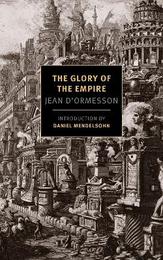
|
Glory Of The Empire: A Novel, A History
Paperback / softback
Main Details
| Title |
Glory Of The Empire: A Novel, A History
|
| Authors and Contributors |
By (author) Barbara Bray
|
|
By (author) Daniel Mendelsohn
|
|
By (author) Jean D'Ormesson
|
| Physical Properties |
| Format:Paperback / softback | | Pages:392 | | Dimensions(mm): Height 203,Width 130 |
|
| Category/Genre | Myth and legend told as fiction |
|---|
| ISBN/Barcode |
9781590179659
|
| Classifications | Dewey:842.914 |
|---|
| Audience | |
|---|
| Edition |
Main
|
|
Publishing Details |
| Publisher |
The New York Review of Books, Inc
|
| Imprint |
NYRB Classics
|
| Publication Date |
3 May 2016 |
| Publication Country |
United States
|
Description
The Glory of the Empire is the rich and absorbing history of an extraordinary empire, at one point a rival to Rome, that Jean d'Ormesson depicts in depth and detail and that he has invented from scratch. Rulers such as Prince Basil of Onessa, who founded the Empire but whose treacherous ways made him a byword for infamy, and the romantic Alexis the Bastard, who dallied in the fleshpots of Egypt, studied Taoism and Buddhism, returned to save the Empire from civil war, and then retired "to learn how to die," come alive in The Glory of the Empire, along with generals, politicians, prophets, scoundrels, and others. D'Ormesson also goes into the daily life of the Empire, its popular customs, and its contribution to the arts and the sciences, which, as he demonstrates, exercised an influence on the world as a whole, from East to West, and whose repercussions are still felt today. But it is all a fiction, a thought experiment worthy of Jorge Luis Borges, and in the end The Glory of the Empire emerges as a great shimmering mirage, filling us with wonder even as it makes us wonder at the fugitive nature of power and the meaning of history itself.
Author Biography
Jean d'Ormesson is an author known for writing autobiographical novels. Also a scholar of philosophy, he has served as the Secretary-General, and then the President, of the International Council for Philosophy and Humanistic Studies at UNESCO, as the director of the French newspaper Le Figaro, as the Dean of the Academie francaise, and as a Grand Croix of the Legion of Honour. He has written over thirty books and his novel The Glory of the Empire was awarded the 1971 Grand Prize by the Academie francaise. He was also awarded Romania's Ovid Prize in 2010. He divides his time between Paris and Corsica. Barbara Bray (1924-2010) was a translator of twentieth-century French literature into English. She was an early champion of Marguerite Duras and Samuel Beckett, and also translated the work of Jean Genet, Jean-Paul Sartre, Jean Anouilh, and Alain Robbe-Grillet. She translated the NYRB Classics The Bridge of Beyond, by Simone Schwarz-Bart; Monsieur Proust, by Celeste Albaret; and Prisoner of Love, by Jean Genet. Daniel Mendelsohn studied classics at the University of Virginia and at Princeton, where he received his doctorate. His essays and reviews appear regularly in The New York Review of Books, The New Yorker, and The New York Times Book Review. His books include The Lost: A Search for Six of Six Million; a memoir, The Elusive Embrace; and the collection Waiting for the Barbarians: Essays from the Classics to Pop Culture, published by New York Review Books. He teaches at Bard College in New York.
Reviews"D'Ormesson provides witty fictional documentation, parodies opinions of historians and literati (there is a one-line parody of Walt Whitman), borrows outrageously and has caught brilliantly the 'Where is Nineveh now?' tone of sunset reflection. A tour de force."-Kirkus Reviews "No epic-sung, printed, or filmed-equals the sweeping turbulence of the 1,000-year history of the Empire...D'Ormesson's satire undermines important assumptions of the reigning ideology: that history is objective; narratives, neutral; that language transmits pre-existing truth...[The novel] is pure pleasure...it will absorb you, puzzle you, make you laugh...So powerful is the narrative that the passive reader risks overlooking much of the satire; the active reader, however, can find materials for a debunking operation the likes of which d'Ormesson himself perhaps never imagined."-William Beauchamp, The New York Times
|